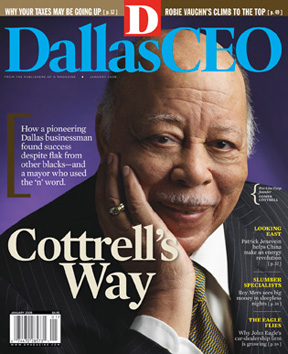 |
| photography by Elizabeth Lavin |
It didn’t take me long to discover that race is approached a little differently in Dallas, Texas. After living for years in the minority melting pots of California and New Mexico—where racial “differences” were often addressed with some delicacy—I’d moved to North Texas in early 1997 to take an editing job at the Dallas Business Journal.
Driving to work one day shortly afterward, I tuned the car radio to an R&B station showcasing a raucous morning crew of black personalities. The voices were teeing off on some local whitebread guy, and they weren’t mincing any words. Their routine was funny—uproariously so, even—but I was struck most by the language. Epithets like “whitey” and “cracker” were tossed around freely, as I recall. It was sharp, no-holds-barred stuff, with a not-so-subtle undercurrent of hostility.
It wasn’t until later, when I learned a little Dallas history, that I realized they’d probably come by their ’tudes honestly. Friends, many of whom grew up in Dallas, told how it wasn’t that long ago that blacks were allowed to sit only in the balcony of Dallas’ Majestic Theatre. How, until the 1960s, African-Americans had little involvement in city government. How one brand-name designer barred a black model from wearing his duds in a fashion show here—in the late 1980s.
That’s the sort of town Comer Cottrell found when he moved his ethnic hair-care company, Pro-Line Corp., to Dallas from Los Angeles a decade earlier. In an excerpt from his new autobiography in the Jan. 2008 issue, the black, Alabama-born entrepreneur remembers the mayor and members of the Dallas Citizens Council using the “n” word during meetings, despite his presence.
Interestingly, Cottrell seems to have shrugged off the slurs, chalking them up to the ignorance of a people struggling with change. His very presence in the meetings was evidence of progress, he believes—and he had problems of a different sort with members of his own race. Some local African-Americans were unwilling to accept a successful black businessman, Cottrell recalls, branding him an “Uncle Tom” who just had to be fronting for powerful whites.
No doubt, Cottrell’s example paved the way for other black businesspeople in North Texas. Even so, this region still has far to go in terms of racial equality in general, much less in the business realm. Just read the daily headlines—and listen to the personalities on morning radio.
Ever so slowly, however, things are changing. More companies, for example, are locating operations in historically impoverished South Dallas, creating more and better jobs there. Dallas CEOs have played an important role in such progress—not least in the increasing diversity of their hiring practices and in their encouragement of better education. Strictly on a personal level, it’s also less “cool” these days to be overtly racist—one of the few positive legacies of the upside-down 1960s.
It’s still cool to be Comer Cottrell, though. And North Texas owes this pioneering businessman a debt of gratitude.




